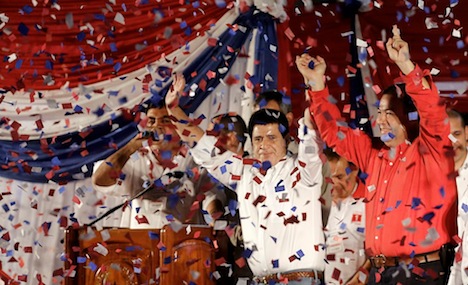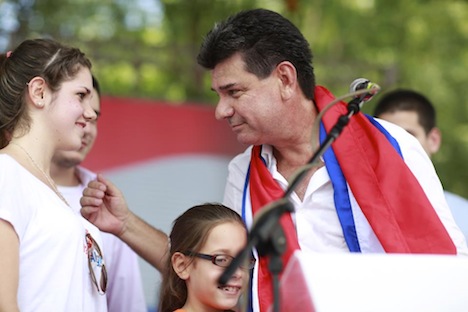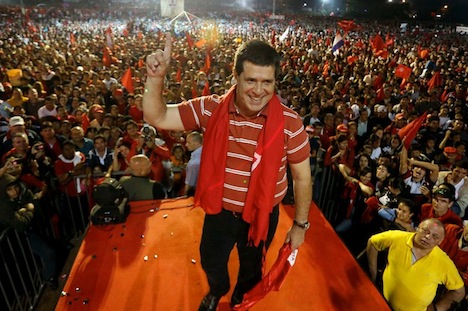Horacio Cartes handily won the Paraguayan presidency Sunday, returning the Partido Colorado to power after former president Fernando Lugo interrupted a 61-year hold on the presidency in 2008.![]()
Cartes (pictured above), one of Paraguay’s wealthiest businessmen, was chosen as the Colorado nominee for his relatively novelty to politics — and it’s true that as a former tobacco magnate, his ties to the old-guard Colorado leadership aren’t incredibly strong, and Cartes didn’t even join the party of former strongman Alfredo Stroessner until 2009, after the election of the leftist Lugo.
Cartes’s election ends an odd gray zone for Paraguay following the rapid-fire impeachment and removal of Lugo from the presidency in June 2012, ostensibly over his administration’s handling of a raid on rural squatters that left 17 people dead, but stemming in large party from mutual hostility from both parties in the Paraguayan political elite that had very little use for Lugo’s administration.
So what comes next for Paraguay?
First and foremost, expect Mercosur, the South American free trade bloc, to reinstate Paraguay’s membership — likely in exchange for Paraguayan acquiescence to the accession of Venezuela, which Mercosur accomplished immediately after Paraguay’s suspension (in light of the fact that Paraguay’s Congress had been holding up Venezuelan membership).
It’s hard to know what to expect from Cartes’s domestic policy priorities, given the vague campaign that he ran, but Cartes will head the most right-wing government in South America — on a continent with various shades of leftism, Cartes remains far to the right of moderate Chilean president Sebastián Piñera (who looks to be succeeded by the moderately leftist former president Michelle Bachelet in November) or the surprisingly dovish Colombian president Juan Manuel Santos. With few natural ideological allies in the region, that could give Paraguay some tough times ahead in respect of trade and foreign policy. We know Cartes is no fan of gay rights or gay marriage after claiming in an interview that he’d rather be shot in the testicles than have a gay son.
Before the election, the Colorados and the other longstanding Paraguayan party, the Partido Liberal Radical Auténtico (PLRA, the Authentic Liberal Radical Party) controlled around two-thirds of the seats in both the Paraguayan Congress’s upper house, the 45-member Cámara de Senadores (Chamber of Senators) and the lower house, the 80-member Cámara de Diputados (Chamber of Deputies).
That’s likely to be the case after the election, though the Colorados will control slightly more and the Liberals will control slightly less. Lugo’s new coalition of leftist parties, the Frente Guasú looks set to have won around 10% in the senatorial elections and will win around five senatorial seats, including one for Lugo himself — somewhat of a success, but certainly not a breakthrough in giving Paraguayans a strong leftist voice in governance for the next five years.
Given that both the Colorados and the Liberals are right-of-center parties, given that the Colorados will not control a majority of seats in either house of Paraguay’s Congress, and given that there were few policy differences between Cartes and his Liberal rival Efraín Alegre, it seems likely that the Colorados and Liberals will likely work together to push through a mutually acceptable agenda.
Cartes clearly has a mandate for the ever-amorphous concept of ‘change,’ winning the presidency with 45.80% to just 36.94% for Alegre. But the best-case scenario might perhaps be continuity of the moderate reforms that outgoing president Federico Franco, a Liberal, pushed in his 10 months in charge — the implementation of Paraguay’s first income tax and at least some steady moves toward land reform and social welfare programs in one of Latin America’s poorest countries.
Although Paraguay has just 6.5 million people, it’s one of the world’s largest soy exporters — it exports some beef and corn products too, but the landlocked nation lacks the natural resource wealth, a large manufacturing or industrial base or the access to ports or major rivers that many of its neighbors boast. So economic reform and poverty will remain a key challenge for Cartes.
The worst-case scenario is that Cartes, who is widely rumored to have links to narco-traffickers and to have made his fortune as much in smuggling as anything else, will preside over a country of unfettered corruption that transforms Paraguay into a crony capitalist state and, perhaps, a new safe haven for narcotics in South America. Despite the small gains Franco made toward alleviating policy through welfare, tax and land reform, those gains could easily be reversed without Cartes’s commitment to see through the full realization of those reforms.



